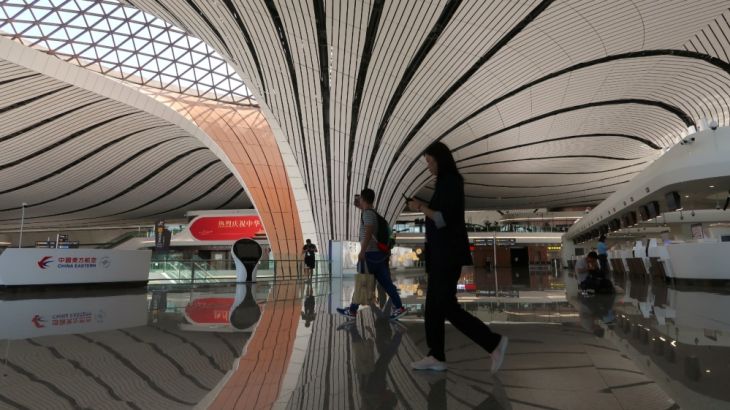Beijing unveils world’s largest airport ahead of 70th anniversary
The airport is expected to cater to 100 million passengers by 2040, but is opening as China’s economy is slowing down.

Beijing’s new airport, the Daxing International, was officially opened on Wednesday by Chinese President Xi Jinping, days before the 70th anniversary of the founding of the People’s Republic of China.
The facility will be able to handle 45 million passengers by 2021, 72 million by 2025 and 100 million eventually in 2040, and cost an estimated $17.5bn to build, according to the Daxing airport’s website,
Keep reading
list of 4 itemsAir Vanuatu goes into liquidation, thousands of passengers stranded
Boeing 737: Plane skids off runway in Senegal, tyre bursts in Turkey
India budget airline cancels more than 80 flights after crew call in sick
“With a 46km (28.6 miles) distance from [Beijing’s] Tiananmen Square … Daxing Airport aims to become the main airport hub of the region,” it said.
Four out of seven planned runways in the starfish-shaped airport are now complete, according to Al Jazeera’s Rob Matheson.
“It’s an indication of how confident China intends to be as far as the expansion of its air network, both domestically as well as internationally [is concerned],” Matheson said.
Domestic and international airlines, as well as aircraft makers, are clamouring for a slice of the pie, but trade tensions between the United States and China could complicate matters.
“Boeing, the US planemaker, says it is eventually going to be able to value China’s air market – which is the planes, manufacturing and support services – at $3 trillion. But … at the same time, the Chinese government is also encouraging their airlines to buy Chinese-made aircraft,” Matheson said.
“In fact, the top three airlines have made significant bids … for domestically-built aircraft. A majority of those are for the short-haul domestic flight market, but there are those that are also designed for the long-haul,” he said.
Boeing expects that as China’s wealthy middle-class doubles in the next decade, one in every five air passengers will be Chinese.
“Currently, Chinese airlines comprise 15 percent of global traffic and worldwide fleet. The traffic and fleet shares will increase to nearly 20 percent over the next decade and beyond,” Boeing has said in its latest projections.
“As China continues its robust growth rate, China is projected to become the world’s largest aviation market in the near future,” it added.
But the airport is opening at a time of growing uncertainty over the pace of global economic growth.
In a report published on Wednesday, the Asian Development Bank said it expects China’s gross domestic product to grow by 6.2 percent this year, down from 6.6 percent last year, and slow down further to 6.0 percent in 2020. It said a big reason for the slowdown, not just in China but across most of Asia, was the ongoing trade war between the US and China.
The new airport, which will be equipped with new technology such as self-service, facial recognition check-in and smart luggage systems, could also face teething troubles, Matheson added.
“With technology as significant as this – robots that park your car, robots that carry your luggage – there’s a lot that can go wrong, let alone before you actually get on the flight,” he said.
The maiden flight from the airport was scheduled at 15:30 Beijing time (07:30 GMT). Commercial flights available for the public are expected to begin flying later in October.
Military pressure
While Daxing International is expected to alleviate some of the pressure on Beijing’s existing Capital Airport, China’s military will still have a part to play in the regulation of Chinese airspace.
“Part of the delays and cancellations that passengers have been seeing (in the previous airport) are because China’s military controls about 80 percent of airspace over China. That gives a very narrow corridor for pilots to be able to fly in and out of China,” Matheson pointed out.
“It’s going to be interesting to see if China’s military is going to be prepared to relax or change the regulations to allow more flights to fly in and out of this airport, and therefore make it more effective,” he said.